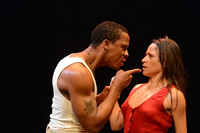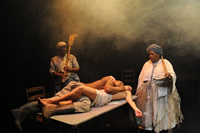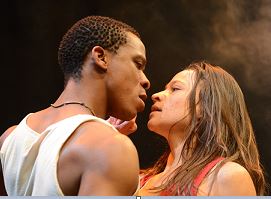A South African Storm Gathers at Riverside Studios
Mies Julie is a tremendous theatrical event, says Penny Flood
Mies Julie reworks August Strindberg’s 19th Century play Miss Julie, transposing its themes of class, love and lust from Sweden to the Karoo, a desert outback in South Africa.
Even if, like me, you are not familiar with the original, this is a terrific piece of writing and direction by South African Yael Farber, providing insights on the troubled times – past and present - of her country. It is engrossing, but is not a comfortable watch as it has the heightened emotions and bloody violence of a Greek tragedy.
The play is set on Freedom Day, almost twenty years after the end of Apartheid. The workers are celebrating, although white land owners are still in charge while black Africans are still the workers who own nothing: "Welcome to the New South Africa, where miracles leave you exactly where you began."
Those ironic words are said by John while cleaning his master’s boots. He is the son of the farm's cleaner and housekeeper, Christine who also brought up the master’s daughter, Julie.
The action takes place in the kitchen on hot and steamy night. "The storm will break soon," says Christine repeatedly, wiping the sweat from her brow. And indeed it does, but not in the way she imagined.

The claustrophobia and the heat the kitchen become a sexually charged pressure cooker as John and Julie realise that what they feel for each other isn’t filial affection. The atmosphere crackles with sexual desire as they tempt and tease until it reaches a bloody crescendo.
The action is fierce, frightening, tender, shocking, beautiful, ugly, violent and peaceful, by turns. The writing's poetic and the sensuality is emphasised by ballet-like movement and other-worldly background sounds.
John is played by a muscular Bongile Mantsai, whose physique emphasises the waif-like fragility of Hilda Cronje, who plays Julie. The choreography emphasises their grace and athleticism and they perform their unfolding tragedy with breathtaking intensity.
Christine is played with dignified weary resignation by Thoko Ntshinga. She accepts her continuing lowly place in the new South Africa. She cleans and cooks and makes the best of things. She wants things to stay the way they are because she knows where she stands.
All three are trapped by their, and their country’s, past. This is represented by Tandiwe Nofrist Lungisa, who walks the stage as the ghost of Christine’s mother. Sometimes Christine can see her. Although John and Julie never see the ghost, they are aware of the burden of their ancestors who are buried on the farm.

Tandiwe is an expert in Xhosa music and her presence is given a strange, spectral quality by her haunting voice singing traditional African songs, while she plays traditional Xhosa instruments. She is amazing.
In spite of all this, for me the violence and anger were too much. When the lovers are tender, they are beautiful. I longed for more exploration of moments like these, at least with their quiet and gentle post-coital love lasting a little longer. They could have made something of their lives if they had tried harder to break free from their past. But they don’t and it rushes to a terrible and shocking end.
I felt let down by the ending and would have preferred
something less tied to the original. But what Farber and her talented cast have created is a tremendous theatrical event.
Mies Julie is at Riverside Studios until May 19. Tickets can be bought online or by calling the box office on 020 8237 1111.
March 18, 2013
Related links
|
